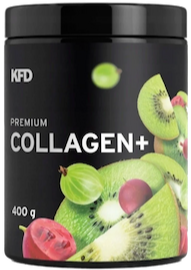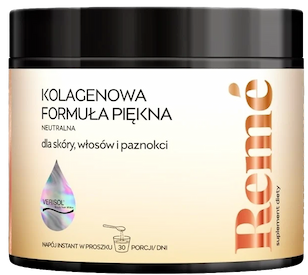- Home
- Collagen
Collagen - properties, effects and what it does (47 facts)
Collagen is an essential building protein in the body. It helps maintain the health of the skin, joints, hair and nails.


Learn more about our editorial process
.

Learn more about our editorial process
.

Learn more about our editorial process
.

Learn more about our editorial process
.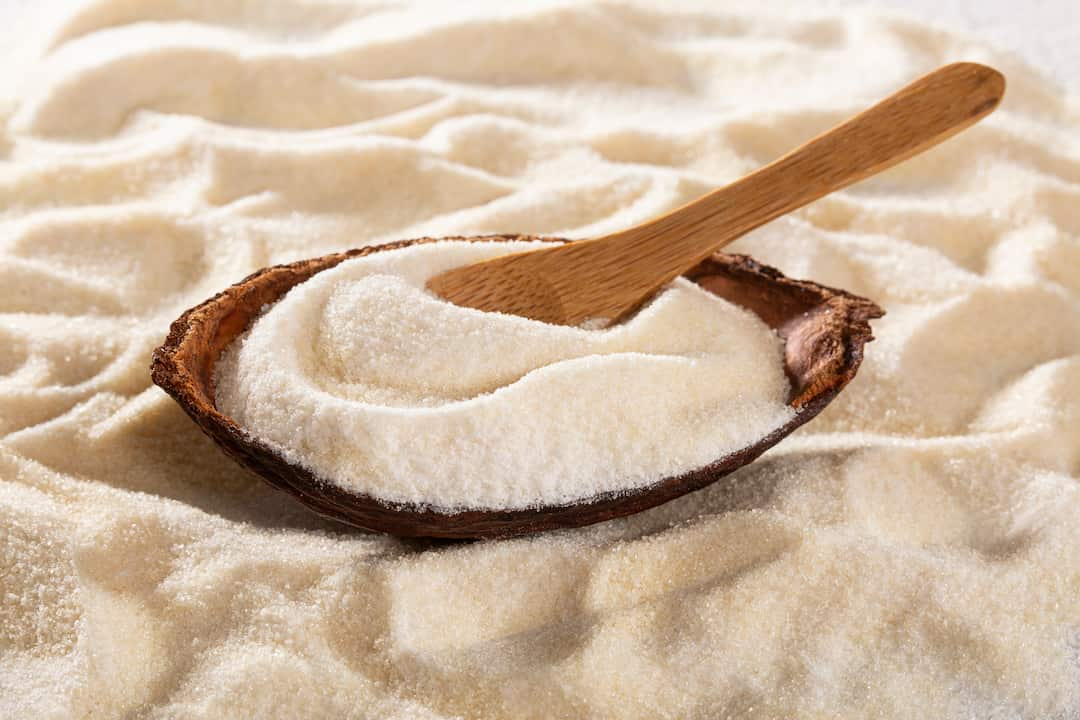
Why you can trust us
Articles on Natu.Care are written based on scientific research, data from government websites and other reliable sources. The texts are written in cooperation with doctors, nutritionists and other health and beauty experts. Articles are reviewed before publication and during significant updates.
.Learn more about our editorial process
.Information about advertisements
Content on Natu.Care may contain links to products from the sale of which we may receive a commission. When creating content, we adhere to high editorial standards and take care to be objective about the products discussed. The presence of affiliate links is not dictated by our partners, and we select the products we review ourselves completely independently.
.Learn more about our terms and Conditions
.Collagen glues you together. Quite literally, because in Greek kolla means glue. It is the most common protein in your body. It keeps your intestines tight, your skin supple, your nails strong and your joints oiled. It's not for nothing that collagen is called the protein of youth.
Unfortunately, around your 25th birthday (happy birthday?), your body finds that it has done its job and settles down. With each passing year, you produce less and less collagen - you can see it with the naked eye and feel it in your joints.
Some of this is not just a result of the fact that your body has done its job.
Some of these problems can be solved by supplementation. That's why, together with a team of doctors, nutritionists and pharmacists, we present the most important information about collagen, which can help you to preserve your everlasting youth.
From this article you will learn:
.- What is collagen and which type is right for you. .
- How to supplement collagen with your diet, .
- When is it worth supplementing it for health and beauty.
- When is it worth supplementing it for health and beauty?
- What is involved in collagen deficiency. .
- What supplement to choose to have results. .
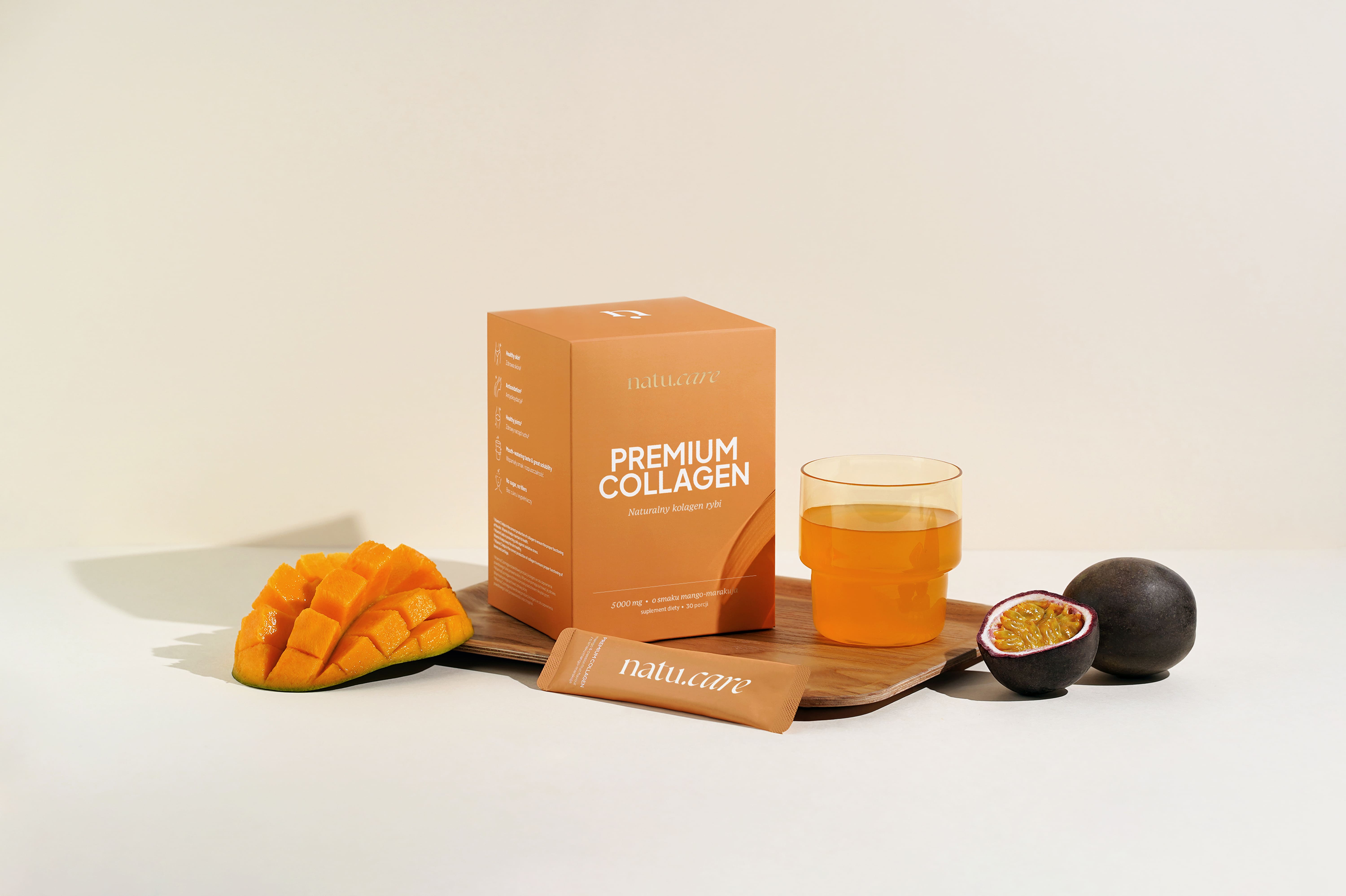
Sprawdź, za co pokochały go tysiące klientek Kolagen Premium 5000 mg, mango-marakuja
Natu.Care Kolagen Premium 5000 mg, mango-marakuja
Natu.Care Kolagen Premium dla zdrowia stawów, skóry, paznokci i włosów. Najlepsza przyswajalność. Optymalna dawka 5 000 lub 10 000 mg. Przebadany przez niezależne laboratorium.
Zobacz więcej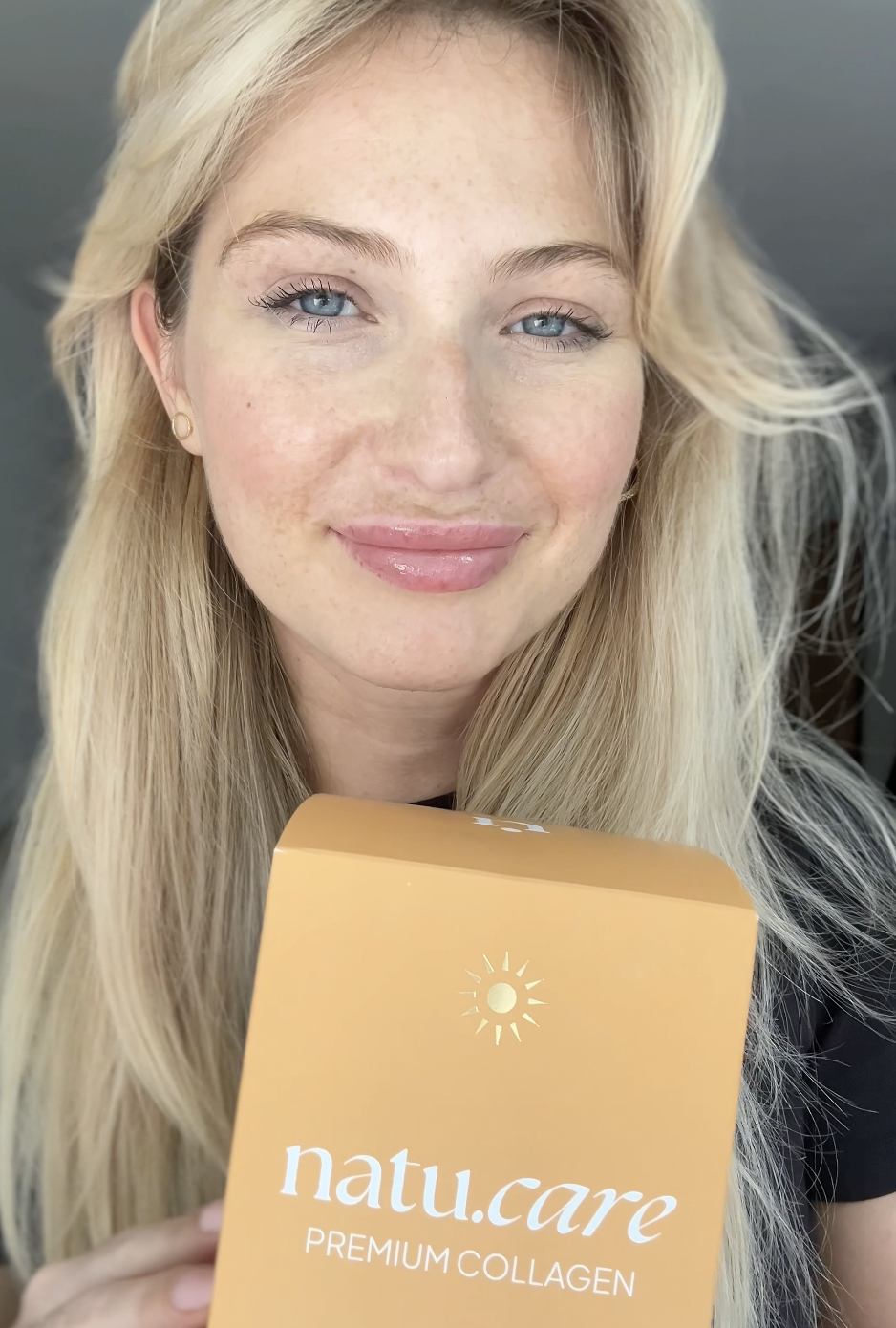
Wybrałam kolagen Natu.Care, ponieważ miał super opinie – a to było dla mnie bardzo ważne! Odkąd go stosuję, moja skóra znacznie się poprawiła i jest nawilżona, a na głowie pojawiły się nowe "baby hair".@Kasia S.
If you are primarily interested in collagen supplementation, see:
.
- The most powerful collagen .
- Collagen for joints .
- Facial collagen
- Collagen for wrinkles
- Collagen for skin
- Collagen for hair
- Collagen for cellulite
- Collagen for stretch marks
- Collagen for acne
What is collagen?
.
.
Collagen is an essential building protein in the body of humans and animals. It forms the skin (makes up over 70% of the weight of the dermis), bones, muscles, joints, tendons, ligaments, connective tissue and fibres. Collagen accounts for 30% of all proteins in the human bodyand. There are approximately 28 types of this protein. The most important is type I .
As you can see, collagen is your main building block - it makes your skin firm, your bones hard and your joints limber. If it's lacking in the right amount, there's no health or beauty.
Which collagen to choose?
.
In a nutshell
Consider the active ingredient content, purity of formulation, additional active ingredients, research, form and origin. Hydrolysed collagen is better absorbed than freeze-dried, and fishy faster than bovine.
Pull out a magnifying glass and point it at:
- Collagen content - the best formulations contain between 2.5 and 15 grams of hydrolysateand. .
- Purity of formulation - the absence of unnecessary fillers is an advantage of some supplements. .
- Additional active ingredients - valuable vitamins and minerals support collagen production and absorption. .
- Research - selected supplements boast laboratory tests that confirm the safety of the supplements. .
- Form - collagen in cream is a no-go, this you already know, however the choice between liquid, powder (collagen in sachets) or tablets is yours.
- Origin - some manufacturers source collagen from farmed fish, while others fish from wild animals, taking care of the environment. .
Hydrolysed collagen, freeze-dried collagen and collagen peptides - what is it all about?
.
When choosing the ideal product, you will come across concepts like these:
.
In brief: hydrolysed collagen = collagen peptides. Hydrolysis is the process, peptides are its product. Nothing suspicious is going on here - in the end, we have the best-absorbed protein with significantly reduced allergenicity and increased efficacyand.
Lyophilised collagen is made by freezing natural collagen and evaporating the water from it . Just like 'dried' raspberries. As a result, the collagen has a smaller volume and fits into, for example, a small capsule .
Collagen powder - which one to choose?
.The best collagen powder you can choose is either premium collagen 5,000 mg or 10,000 mg. The formula comes in two flavours - cacao and mango-maracuja.
Natu.Care Collagen Premium 5000 mg, mango-maracuja

- Collagen content: 5000 mg marine collagen hydrolysate
- .
- Additional active ingredients: vitamin C, low molecular weight hyaluronic acid (and L-theanine and coenzyme Q10 in cocoa flavoured collagen or vitamin A and vitamin E in mango–passion fruit flavoured collagen)
- .
- Form: powder sachets
- .
- Dose: 1 sachet per day
- .
- Sufficient for: 30 days
- .
Product description
Fish collagen from the Natu.Care brand in a dose of 5000 mg. The formula contains a sufficient portion of the active substance to positively affect your joints, musculoskeletal system and immunity.
Take care of your tendons, joint cartilage, ligaments, muscles and even bones by supplying them with the building blocks to function properly. Move without bólu and provide the necessary support for any physical activity.
And as a „gratis” to regular supplementation, you will also receive firm skinóhand, healthy and shiny hair and strong nails.
Natu.Care Premium Collagen is available in two flavours – Cacao Bloom and Rise&Shine. Both formulas are based on the following active ingredients: marine collagen hydrolysate, wild roseóbud extract and hyaluronic acid.
Additionally, Cacao Bloom contains natural L-theanine, coenzyme Q10 and defatted Dutch cacao. Rise&Shine instead contains vitamin E and vitamin A.
These are the best collagens in the world.
These best fish collagens on the market also rós taste – Cacao Bloom is a treat for chocolate lovers. Rise&Shine will appeal to those whoóenjoy the refreshing taste of mangoófruit and passion fruit.
Pros and cons
Fish collagen from the Natu.Care brand in a dose of 5000 mg. The formula contains a sufficient portion of the active substance to positively affect your joints, musculoskeletal system and immunity.
Take care of your tendons, joint cartilage, ligaments, muscles and even bones by supplying them with the building blocks to function properly. Move without bólu and provide the necessary support for any physical activity.
And as a „gratis” to regular supplementation, you will also receive firm skinóhand, healthy and shiny hair and strong nails.
Natu.Care Premium Collagen is available in two flavours – Cacao Bloom and Rise&Shine. Both formulas are based on the following active ingredients: marine collagen hydrolysate, wild roseóbud extract and hyaluronic acid.
Additionally, Cacao Bloom contains natural L-theanine, coenzyme Q10 and defatted Dutch cacao. Rise&Shine instead contains vitamin E and vitamin A.
These are the best collagens in the world.
These best fish collagens on the market also rós taste – Cacao Bloom is a treat for chocolate lovers. Rise&Shine will appeal to those whoóenjoy the refreshing taste of mangoófruit and passion fruit.
Additional information
Fish collagen from the Natu.Care brand in a dose of 5000 mg. The formula contains a sufficient portion of the active substance to positively affect your joints, musculoskeletal system and immunity.
Take care of your tendons, joint cartilage, ligaments, muscles and even bones by supplying them with the building blocks to function properly. Move without bólu and provide the necessary support for any physical activity.
And as a „gratis” to regular supplementation, you will also receive firm skinóhand, healthy and shiny hair and strong nails.
Natu.Care Premium Collagen is available in two flavours – Cacao Bloom and Rise&Shine. Both formulas are based on the following active ingredients: marine collagen hydrolysate, wild roseóbud extract and hyaluronic acid.
Additionally, Cacao Bloom contains natural L-theanine, coenzyme Q10 and defatted Dutch cacao. Rise&Shine instead contains vitamin E and vitamin A.
These are the best collagens in the world.
These best fish collagens on the market also rós taste – Cacao Bloom is a treat for chocolate lovers. Rise&Shine will appeal to those whoóenjoy the refreshing taste of mangoófruit and passion fruit.
User review
Fish collagen from the Natu.Care brand in a dose of 5000 mg. The formula contains a sufficient portion of the active substance to positively affect your joints, musculoskeletal system and immunity.
Take care of your tendons, joint cartilage, ligaments, muscles and even bones by supplying them with the building blocks to function properly. Move without bólu and provide the necessary support for any physical activity.
And as a „gratis” to regular supplementation, you will also receive firm skinóhand, healthy and shiny hair and strong nails.
Natu.Care Premium Collagen is available in two flavours – Cacao Bloom and Rise&Shine. Both formulas are based on the following active ingredients: marine collagen hydrolysate, wild roseóbud extract and hyaluronic acid.
Additionally, Cacao Bloom contains natural L-theanine, coenzyme Q10 and defatted Dutch cacao. Rise&Shine instead contains vitamin E and vitamin A.
These are the best collagens in the world.
These best fish collagens on the market also rós taste – Cacao Bloom is a treat for chocolate lovers. Rise&Shine will appeal to those whoóenjoy the refreshing taste of mangoófruit and passion fruit.
Natu.Care Collagen Premium 10000 mg, cherry

- Collagen content: 10,000 mg of hydrolyzed bovine collagen
- Additional active ingredients: vitamin C, low molecular weight hyaluronic acid, glucosamine, chondroitin, extract of Indian frankincense resin (boswellia serrata)
- Form: powder sachets for drinking
- Serving: 1 sachet per day
- Lasts for: 30 days
Product description
One of the strongest collagens on the market, providing as much as 10,000 mg per daily serving. This product can effectively support the condition of joints, skin, hair, and nails.
With this supplement, you will support your skeletal and joint system as well as your beauty, helping you visually halt the aging process and feel rejuvenated!
Pros and cons
Pros:
- The daily portion of collagen is very large – as much as 10,000 mg.
- Proven collagen formula – COLLinstant, whose effectiveness has been confirmed in clinical studies.
- Effective dose of hyaluronic acid, which additionally moisturizes the skin and positively affects joint health.
- Vitamin C supports the body's natural collagen production.
- Glucosamine is a fundamental building block of compounds found in joint cartilage and a component of collagen that gives elasticity to connective tissue in tendons.
- Chondroitin is a natural component found in the human body, mainly in cartilage. This large molecule (mucopolysaccharide) has the ability to absorb water, which helps maintain the elasticity and resilience of cartilage.
- Frankincense resin extract supports blood circulation and joint mobility and reduces their stiffness. It may help alleviate inflammatory conditions.
- The composition has been tested by the independent and accredited J.S. Hamilton laboratory.
Cons:
- None.
Additional information
Users praise Natu.Care Collagen Premium for the easy dissolving of the powder.
ALLDEYNN Collarose Fish
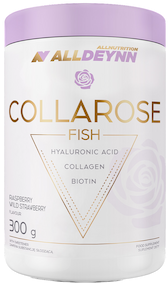
- Collagen content: 5000 mg hydrolysate fish collagen VERISOL F® .
- Additional active ingredients: vitamin C, hyaluronic acid, biotin
- Form: powder to dissolve in water .
- Dose: one scoop (6 g) of powder daily .
- Sufficient for: 50 days .
Product description
Atlantic cod collagen VERISOL F® contained in the formula are easily absorbed collagen peptides of fish origin. Regular supplementation can firm your skinóhand and slow down the ageing process. Your nails will become stronger and stop breaking. The addition of biotin will improve the condition of your hairów. The collagen portion is high enough to also have a good effect on your joints, muscles and bones.
Pros and cons
Atlantic cod collagen VERISOL F® contained in the formula are easily absorbed collagen peptides of fish origin. Regular supplementation can firm your skinóhand and slow down the ageing process. Your nails will become stronger and stop breaking. The addition of biotin will improve the condition of your hairów. The collagen portion is high enough to also have a good effect on your joints, muscles and bones.
Additional information
Atlantic cod collagen VERISOL F® contained in the formula are easily absorbed collagen peptides of fish origin. Regular supplementation can firm your skinóhand and slow down the ageing process. Your nails will become stronger and stop breaking. The addition of biotin will improve the condition of your hairów. The collagen portion is high enough to also have a good effect on your joints, muscles and bones.
Expert and user opinion
Atlantic cod collagen VERISOL F® contained in the formula are easily absorbed collagen peptides of fish origin. Regular supplementation can firm your skinóhand and slow down the ageing process. Your nails will become stronger and stop breaking. The addition of biotin will improve the condition of your hairów. The collagen portion is high enough to also have a good effect on your joints, muscles and bones.
DuoLife Collagen fish collagen 2500 mg
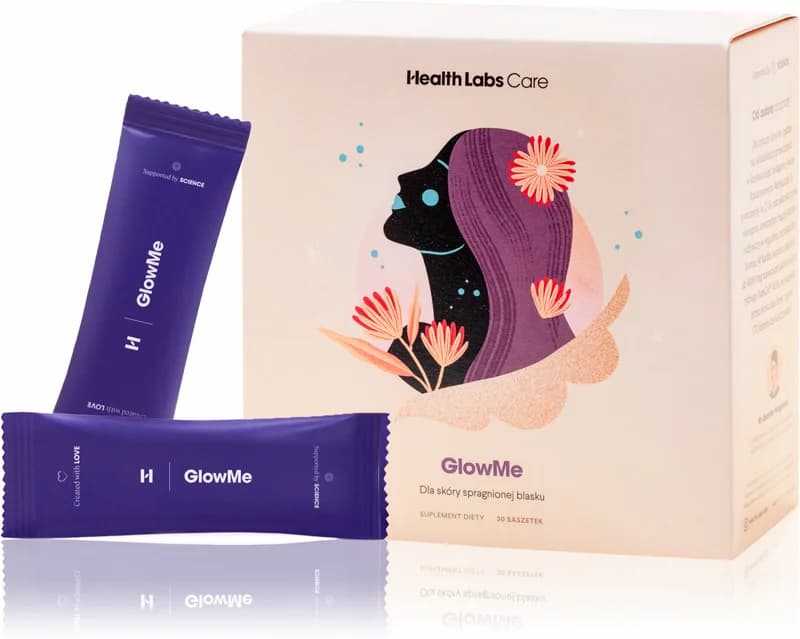
- Collagen content: 2500 mg collagen
- Additional active ingredients: vitamin C, silicon, glucosamine, hyaluronic acid, nettle and bamboo extracts
- Form: liquid to drink .
- Dose:25 ml .
- Sufficient for: 30 days .
Product description
100% natural collagen liquid without unnecessary ingredientsós. The composition of ingredientsós improves the appearance and condition of skinóry, hairów, nails. DuoLife is a good choiceór if you notice the first signs of skinóry ageing or want to stop this process. A tasty liquid, convenient to use.
Pros and cons
100% natural collagen liquid without unnecessary ingredientsós. The composition of ingredientsós improves the appearance and condition of skinóry, hairów, nails. DuoLife is a good choiceór if you notice the first signs of skinóry ageing or want to stop this process. A tasty liquid, convenient to use.
Additional information
100% natural collagen liquid without unnecessary ingredientsós. The composition of ingredientsós improves the appearance and condition of skinóry, hairów, nails. DuoLife is a good choiceór if you notice the first signs of skinóry ageing or want to stop this process. A tasty liquid, convenient to use.
User review
100% natural collagen liquid without unnecessary ingredientsós. The composition of ingredientsós improves the appearance and condition of skinóry, hairów, nails. DuoLife is a good choiceór if you notice the first signs of skinóry ageing or want to stop this process. A tasty liquid, convenient to use.
Pharmovit liquid collagen 10000 mg
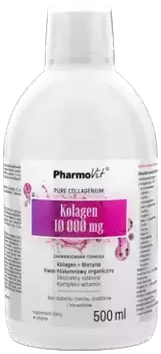
- Collagen content: 10000 mg hydrolysed bovine collagen types I and III .
- Additional active ingredients: hyaluronic acid, natural plant extracts, vitamin C, B vitamins, zinc, vitamin D
- Form: vials .
- Dose: 25 ml .
- Sufficient for: 20 days .
Product description
A solid daily dose of collagen for jointómuscle and bone health and beauty. The duo of collagen and vitamin C has a positive effect on each other, so that „the protein of youth” is better absorbed and more efficiently produced in the body.
Pros and cons
A solid daily dose of collagen for jointómuscle and bone health and beauty. The duo of collagen and vitamin C has a positive effect on each other, so that „the protein of youth” is better absorbed and more efficiently produced in the body.
Additional information
A solid daily dose of collagen for jointómuscle and bone health and beauty. The duo of collagen and vitamin C has a positive effect on each other, so that „the protein of youth” is better absorbed and more efficiently produced in the body.
KFD Premium Collagen+
Product description
High dose of collagen and a real bomb of vitamins C and D and organic sulphur. With this preparation the effects will come immediately. You will improve the firmness of your skin and reduce wrinkles. Your hair and nails will be strong and shiny.
A generous dose of collagen will improve the mobility of your jointsós, benefit your bone system and muscles. Do you do sports and need a product thatós able to keep up with your needs? This product will do the trick.
Pros and cons
High dose of collagen and a real bomb of vitamins C and D and organic sulphur. With this preparation the effects will come immediately. You will improve the firmness of your skin and reduce wrinkles. Your hair and nails will be strong and shiny.
A generous dose of collagen will improve the mobility of your jointsós, benefit your bone system and muscles. Do you do sports and need a product thatós able to keep up with your needs? This product will do the trick.
Additional information
High dose of collagen and a real bomb of vitamins C and D and organic sulphur. With this preparation the effects will come immediately. You will improve the firmness of your skin and reduce wrinkles. Your hair and nails will be strong and shiny.
A generous dose of collagen will improve the mobility of your jointsós, benefit your bone system and muscles. Do you do sports and need a product thatós able to keep up with your needs? This product will do the trick.
Expert opinion
High dose of collagen and a real bomb of vitamins C and D and organic sulphur. With this preparation the effects will come immediately. You will improve the firmness of your skin and reduce wrinkles. Your hair and nails will be strong and shiny.
A generous dose of collagen will improve the mobility of your jointsós, benefit your bone system and muscles. Do you do sports and need a product thatós able to keep up with your needs? This product will do the trick.
Product description
The dietary supplement from Remé contains beef collagen in a patented formula and vitamin C, whichóra aids its absorption. The formula comes in three flavours: neutral, orange-maracuja and strawberry-pomegranate. The formula can effectively support and improve the condition of the skinóry, hairóry and nails.
Pros and cons
The dietary supplement from Remé contains beef collagen in a patented formula and vitamin C, whichóra aids its absorption. The formula comes in three flavours: neutral, orange-maracuja and strawberry-pomegranate. The formula can effectively support and improve the condition of the skinóry, hairóry and nails.
Additional information
The dietary supplement from Remé contains beef collagen in a patented formula and vitamin C, whichóra aids its absorption. The formula comes in three flavours: neutral, orange-maracuja and strawberry-pomegranate. The formula can effectively support and improve the condition of the skinóry, hairóry and nails.
The dietary supplement from Remé contains beef collagen in a patented formula and vitamin C, whichóra aids its absorption. The formula comes in three flavours: neutral, orange-maracuja and strawberry-pomegranate. The formula can effectively support and improve the condition of the skinóry, hairóry and nails.
See also:
.
- Which collagen to choose - a guide
- What is the best absorbed collagen
- What is the molecular weight of collagen .
What are the types of collagen?
.
There are about 28 types of collagen. However, it all depends on who is counting and how they are doing it. Well, scientists! Less about specific numbers. For you, the most important types are: I, II, III, V and X (to be sure - these are Roman numerals, not letters)and.
. . .
| Type | Properties | |
|---|---|---|
| Type I | The most important type of collagen in the body (90%). It is found in, among others, skin proper, bones and ligaments. | |
| Type II | Responsible for the condition of bones, cartilage tissue and joints. | |
| joints. | ||
| Type III | The second most important type of collagen (5-20%) in the body. Supports e.g. the cardiovascular system, blood vessels and intestines. | Collagen is the most important type of collagen in the body. |
| Type V | Influences the structure of, among others, the bone matrix, liver, lungs and placenta. | |
| Type X | Bone building block that is also found in joints. It is crucial for proper recovery e.g. after fractures. | |
| Type X. |
Type I
.
Type I collagen is the most important type of youth protein in the body. It is also the best studied. It accounts for up to 90% of all collagen in your body. It is mainly found in the dermis, tendons, bones, ligaments and internal organsand.
Per gram, type I collagen is stronger than steel..
Molecular Cell Biology, 6th Edition(Lodish et al., 2007)
Type II
.
Type II collagen is responsible for building bone and cartilage tissue. If you suffer from joint or bone pain, this is your type - the strongest collagen for joints. Supplementation with the second type of collagen can relieve pain and stiffness, as well as prevent diseases such as rheumatoid arthritis (RA) and osteoarthritisand.
.
Where does type II collagen occur?
.
Type II collagen is a structural component of the cartilage of the glabrous surfaces of joints. It is also found in other tissues and in the retina, sclera and lens of the eyeand.
Caution
.If you don't approach type II collagen supplementation properly, you could end up with increased urinary oxalate. Put simply: you may develop kidney stones. However, this is rare.
Type III
.
Third on the list, but second most important. It makes up about 5-20% of all collagen in your body. It is crucial for the proper functioning of the circulatory system. It is a structural component of the uterus, intestines and blood vessels - its deficiency can lead to damage to these organsand.
Type III collagen is the best mate of type I collagen - they work together on most processes in the bodyand.
Type V
.
Type V collagen is also known as fibrous collagen. It is a key protein in the process of fibril formation. It is responsible for the structure of the bone matrix, cornea, liver, lung and placenta. It cooperates with types I, II and III.
Type V collagen is essential for normal hair and eye healthand.
Type X
.
Type X collagen is an important building block of bone. It is also found in cartilage, and a deficiency of it (as well as a deficiency of type II collagen) can lead to osteoarthritis, for example. Most commonly, doctors recommend supplementing with type X collagen after a bone fracture or break, as it speeds up recoveryand.
.
What effects does collagen provide?
.
In a nutshell
.Collagen primarily supports the skin - making it firmer, more elastic and moisturising it. In addition, it can have a positive effect on joints, hair and nails. Collagen is also important for immunity, heart health and the skeletal system.
You hear collagen, you think shiny hair, strong nails and firm skin. It's all there. However, the protein of youth isn't just about beauty - it's also about overall health and proper functioning of the body.
See what collagen helps:
.
Makes skin firmer
.
Collagen is the main component of your skin - it makes up about 70-80% of its dry weight. It is responsible for the structural and mechanical properties of the dermis. It strengthens, firms and moisturises the complexion. As we age, collagen production slows down, which can result in dry skin and the formation of wrinkles.
.
Reduces wrinkles
.
Using youth protein can delay the appearance of wrinkles. Studies suggestand that taking collagen supplements orally increases skin elasticity and reduces visual aging. Collagen will also help you to eliminate facial discolouration.
See also:
Alleviates acne
.
Wounds, small scars and blemishes from scratching acne pimples - all of us with acne-prone skin know it. Collagen for acne can support and speed up the healing process of these woundsand, and, in the form of injections, help heal scars.
Collagen supplementation alone will not cure acne - you'll need to see a dermatologist for that.
Cover scars
.
Collagen strengthens the dermis layer of the skin and makes it thicker and more elasticand. The firmness of the skin helps to stretch scars. This allows them to be less visible. Collagen can also help with wounds, burns and varicose veins.
Collagen supplemented orally, however, will not eliminate scars 100% - injections may be more beneficial.
Reduces stretch marks
.
Collagen firms and elasticises the skin covering the areas where stretch marks are most likely to appearand. Systematic supplementation and a healthy diet can regenerate the skin and prevent the formation of stretch marks.
If you are looking for a more effective method than standard supplementation, as with scars, rely on collagen injectionsand.
.
Note
Many internet users are looking for collagen for psoriasis. Unfortunately, as of yet, there is no scientific basis to count on collagen to help with this disease.
I think treating psoriasis with collagen is a big misnomer. The protein helps to improve skin hydration, but psoriasis is a chronic, multisystem inflammatory disease with an immune basis. Therefore, collagen won't help much and certainly won't cure it..
 .
.
Ilona Krzak Master of Pharmacy
.
Strengthens joints
.
Collagen is involved in the production of joint lubricant, which reduces joint friction - this is particularly important for healthy knees. The less collagen you produce, the less synovium you produce.
Without adequate glide, cartilage rubs painfully. Over time, you can even develop osteoarthritis.
A joint without synovial fluid is not a problem.
A joint without lubricant is like a bicycle pedal without grease - seemingly working, but noisy; seemingly going, but reluctant. And at the end of it, trach, something can break.
It's not like that.
How collagen works for joints:
.
- rebuilds cartilage tissue, .
- improves flexibility, .
- reduces pain, .
- increases mobility, .
Will collagen work for 'tennis elbow'?
.Tennis elbow is an ailment affecting the muscles and tendons of the elbow area. The cause of this condition is not a lack of collagen. Nevertheless, youth protein supplementation can reduce pain and inflammation.
Nourishes hair
.
The basic component of hair is keratin. For its production, it requires amino acids, which you can provide to your body along with collagen (e.g. proline). The protein of youth can strengthen hair and prevent hair loss or breakageand.
How else does collagen work for hair?
.
- Can reduce progressive greying . .
- Improves the condition of the scalp, which is the base for newly emerging hair . .
Hardens nails
.
Nails, like hair, are made up mainly of keratinand. Collagen supplementation can give your nails elasticity and make them more resilient to damage. What's more, research suggests that supplemented collagen positively affects the rate of nail growth .
Improves immunity
.
Collagen can support your immunity. It provides the body with numerous amino acids, including glutamine, which supports the immune system. Collagen also stimulates immune cells, so it can reduce the healing time of infectionsand.
Collagen also improves the health of your gut. And it's not only important for your digestive system, but also your immune system. Up to 70-80% of immune cells are found right in the gutand.
Collagen supports the regeneration of the intestinal or gastric mucosa. Therefore, supplementation is beneficial for inflammation. I can recommend it to people who are struggling with, for example, stomach ulcers or intestinal diverticula..
 .
.
Julia SkrajdaDietitian
..
Care for the heart
.
Collagen provides your arteries and blood vessels with the right structure to ensure adequate blood flow. A deficiency of the youth protein causes the arteries to become less elastic. The result can be atherosclerosis and, in the long term, even a stroke or heart attackand.
Despite the promising results, further research is needed to definitively confirm the effects of collagen on heart health.
Builds the skeletal system
.
Collagen gives your bones structure. More years, less collagen - you increase your risk of developing, for example, osteoporosis (a condition manifested by low bone density and a higher risk of fracturesand).
Collagen supplementation may reduce bone degradation. In some trials, people taking collagen after 12 months had up to 7% higher bone density . However, further research is needed to confirm the effectiveness of collagen supplementation for bone health.
In which foods is collagen present?
.
In a pill
.Collagen is found in beef or pork bone broth, chicken with skin, chicken feet, offal, gelatine or sardines, among others. Nutrients - mainly vitamin C, zinc and copper - are required for its proper absorption.
If the thought of skins, cartilage and giblets makes you think fuj, you're left with supplementation - you'll be choosing an equivalent product in a moment.
Collagen-rich products include:
- beef or pork bone broth, .
- chicken with skin, .
- cicken feet, .
- sardines, .
- guts (liver, heart, brain, kidneys), .
- gelatin, .
- seafood (lobster, prawns, octopus, squid), .
- meat and cartilage, .
- meat jellies, .
What nutrients support collagen production?
.
You know what to eat to provide collagen. Now see what will help you assimilate this protein effectively:
. . . . . . . . . . .
| Nutrient | Sources | |
| Vitamin C | Citrus fruits, kiwis, strawberries | Sources of vitamin C. |
| Zinc | seafood, meats, beans | |
| Seafood, meats, beans | ||
| Copper | Copper | Nuts, seafood, seeds |
| Hyaluronic acid | Beef liver, tofu, soya milk | |
| organic sulphur (MSM) | Celery, garlic, eggs | |
| Manganese | monds, peanuts, beans | |
| Manganese. | Vitamin A | Kale, spinach, tomatoes |
The most effective collagen preparations contain vitamin C or its natural form (e.g. rosehip extract), which is better absorbed. The presence of vitamin C is often more important than the protein dose itself, as this vitamin contributes to the body's proper absorption of collagen..
 .
.
Julia SkrajdaDietitian
.In which fruits and vegetables is there collagen?
.
In none. Collagen is an animal protein that is not present in plants. However, some vegetables and fruits can aid collagen synthesis and absorption (via vitamins and minerals).
Vegetables and fruits that particularly support the body's production and absorption of collagen are:
.
- citrus (oranges, grapefruit, lemons), .
- red and green peppers, .
- tomatoes, .
- leaf vegetables (broccoli, kale, Brussels sprouts), .
- beans, .
- avocados, .
- berries, .
- garlic, .
- pumpkin, .
Some herbs and spices, rich in vitamin C or amino acids, can also be helpful:
- wild rose, .
- acerola, .
- clover, .
- field horsetail, .
- lance grass, .
- bear garlic (containing additional sulphur). .
Collagen in vegetarian and vegan diets
.
Unfortunately. Vegan collagen does not exist. All supplements are of animal origin, mainly fish, beef and pork.
Vegetarians and vegans may have more problems with collagen deficiency. If you don't eat fish and meat, be sure to cut into the vegetables and fruits listed above.
Vegetarians and vegans may be more deficient in collagen.
Scientists and manufacturers are working on genetically modified collagen from yeast or bacteria. Research is also underway to enable the production of 'plant-based' collagen from bamboo or rice. For now, however, only pescatarians have their options (pescatarians meaning 'vegetarians who eat fish').

Sprawdź, za co pokochały go tysiące klientek Kolagen Premium 5000 mg, mango-marakuja
Natu.Care Kolagen Premium 5000 mg, mango-marakuja
Natu.Care Kolagen Premium dla zdrowia stawów, skóry, paznokci i włosów. Najlepsza przyswajalność. Optymalna dawka 5 000 lub 10 000 mg. Przebadany przez niezależne laboratorium.
Zobacz więcej
Wybrałam kolagen Natu.Care, ponieważ miał super opinie – a to było dla mnie bardzo ważne! Odkąd go stosuję, moja skóra znacznie się poprawiła i jest nawilżona, a na głowie pojawiły się nowe "baby hair".@Kasia S.
Collagen deficiency
.
In a nutshell
.At the age of 25-30 you may already be affected by the first symptoms of collagen deficiency such as skin problems, damaged hair and nails or joint pain. Most often, the process of collagen depletion starts around the age of 30and. By the time you turn 40, about 65% of collagen remains in your body, 10 years later 60%, and by the age of 70 you are left with only 30% of the protein of your youth .
In women, the collagen degradation process starts faster than in men. This is due to a disruption of the oestrogen economy. Problems with hormone secretion by the reproductive system translate into collagen synthesis in the body. Therefore, it is worth taking care of correct hormone levels, ovulation and menstruation, as well as seeing a gynaecologist regularly and having your hormones TSH, oestradiol, progesterone, LH and FSH checked once a year..
 .
.
Julia SkrajdaDietitian
.Causes of collagen deficiency and:
- You are getting older. .
- You're eating too little collagen, protein, vitamins and minerals.
- You're not eating enough.
- You spend too much time in the sun (remember filtration creams).
- You have too much sun.
- You have a genetic predisposition. .
- You abuse alcohol. .
- You eat too much sugar. .
- You smoke cigarettes. .
- You stay in extreme temperatures. .
- You are affected by environmental pollutants.
- You are not taking proper care of your body.
- You do not take adequate care of sleep hygiene. .
- You live under constant stress. .
What do you know about collagen deficiency?
Your entire body is supplied with collagen to some degree. If you don't have enough of the youth protein, you will observe:
.
You will be concerned about the state of your skin
.
- Wrinkles, .
- Dry and flabby skin, .
- cellulite, .
- stretch marks, .
- lack of skin firmnessand. .
Hair is damaged and nails are brittle
.
When the body lacks collagen, hair becomes dull, no longer frizzy and the ends begin to splitand.
Equally unpleasant things start to happen to nails - they become brittle and less aesthetically pleasing .
.
If you want to improve the appearance of your hair, then rely on external preparations such as conditioners or masks. If you are looking for a product that will provide you with the amino acids needed to build collagen - bet on collagen hydrolysate. Its effects have been proven in studies..
 .
.
Ilona Krzak Master of Pharmacy
.
Your joints hurt
.
When there is too little youth protein, joints become stiff, painful or swollenand. This can even result in mobility problems and, in the long term, diseases such as osteoporosis or arthritis .
Other symptoms of collagen deficiency include:
.
- reduced immunity, .
- longer recovery (after injuries), .
- circulatory problems,
- decreased immunity.
- decreased appetite, .
- breakage of bones,
- problems with the eyes,
- problems with the eyes,
- problems with the eyes,
- problems with the eyes.
- problems with the eyes, .
How to prevent collagen loss from the body?
.
As you can see, there are a multitude of factors that damage collagen. To prolong your collagen youth and replenish collagen in your body:
- Stay on a proper diet full of collagen-rich foods.
- Get a healthy diet.
- Care for a healthy lifestyle, limit alcohol, try to quit your addictions. .
- Try to move more to strengthen your bones and muscles. .
- Try to get a good night's sleep. .
- Consider cosmetic treatments, such as microneedling. .
- Stake appropriate supplementation. .
Collagen supplementation
.
In a nutshell
Supplemented collagen is safe, and at a dose of 2.5-15 grams of hydrolysate can produce noticeable results in as little as 8-24 weeks. You can take collagen at any time of day. Supplementation does not need to be withheld, go ahead and take collagen without interruption. However, under no circumstances should you consume collagen preparations for animals.
Most often you will find hydrolysed collagen in dietary supplements. Research suggests that taking 2.5-15 grams of such collagen per day is both effective and safeand.
.
Lesser doses of the youth protein can also theoretically help, but you will wait longer for results .
.
What will the different portions of collagen work for?
.
- 2.5 grams positively affects skin health and hydrationand. .
- 5 grams improves bone density and supports your joints . .
- 15 grams helps increase muscle mass . .
Is collagen safe?
.
Don't be alarmed, collagen for drinking and in tablets is safe. After all, collagen is simply a protein and occurs naturally in our bodies. Taking it in most cases has no side effectsand.
Is there a 'but'?
.
An obvious contraindication to taking collagen is allergies to the ingredients in a particular product. If you are intolerant to fish or seafood, choose beef or pork collagensand.
Other contraindications to drinking collagen include:
.
- kidney problems (collagen can then only be taken after consultation with a doctor), .
- pregnancy and breastfeeding (supplementation is allowed after a green light from a specialist), .
- diabetes (in the case of collagen containing sugar or selected sweeteners), .
- interactions with medications (if you are taking other supplements or medications, ask your pharmacist or doctor about interactions).
Can I buy myself collagen for my pets?
.
A literal horse dose of collagen? Bad idea.
Animals have different organisms to humans and age differently, so they need different doses of collagen. Besides, collagen supplements for animals may contain special additives, and such substances will only harm you. Not to mention the potential differences in production standards.
Doctor's opinion on collagen supplements
.
Collagen administered orally (e.g. in tablet, liquid or dissolved powder form) can be used for its synthesis in the body. The two amino acids proline and lysine play the most important role in this process..
 .
.
Vitold Tomaszewskidoctor of medical sciences
.Can excess collagen be brought about?
You can, but you would have to go to great lengths to bring about collagen excess. Most often supplementation of this protein is safeand. However, if you significantly exceed the dosage recommended by the manufacturer, you may experience unpleasant symptoms such as:
- thickening of the skin, .
- digestive problems, .
- congestion, constipation or diarrhoea, .
In most cases, once the dosage of the supplements is reduced, the symptoms will disappear. However, if you have stopped taking collagen and you continue to experience side effects - see your doctor.
.
Side effects of collagen supplementation
.
Side effects of supplemented collagen are rare. They can include allergic reactions and stomach problems. More side effects are associated with injectable collagen - swelling or redness of the skin, infection, skin rash or scarring. Some people may also be allergic to collagen. They will then experience a rash, swollen skin or difficulty breathing with supplementationand.
Facts about collagen
.
How is collagen structured?
.
The basic building blocks of collagen are amino acids - compounds that are responsible for the structure of all proteins in the body. Collagen is mainly made up of glycine, proline and hydroxyproline, but there are other amino acids in its composition. Together, they form three chains in the form of a triple helixand.
How does the body produce collagen?
.
The process of collagen synthesis (production) most often takes place in the fibroblast cells in the dermis. These are responsible for the production of collagen and other supporting (skeletal) tissues.
Collagen synthesis takes place in the dermis.
Collagen synthesis occurs both inside and outside the celland.
.
Where is collagen used?
.
Cosmetics
.
Because of its valuable properties on skin, hair and nails, collagen is an ingredient in many cosmetics (e.g. creams, serums, gels, masks or lotions). It is most often added to them in the form of a hydrolysate - so it is more easily absorbed.
.
Some preparations contain pure collagen, while others also contain ingredients that support its production, e.g. (vitamin C or hyaluronic acid).
.
Note that collagen in cream does not produce the expected results on the skin.
Why does collagen in cream not work?
.
Since collagen is good for the skin, you might think that applying it directly to the skin would be super effective. Unfortunately.
When you apply collagen in a cream, you are not giving your skin its due benefits. That's because the collagen molecules are too large to penetrate the dermis.
Collagen in a cream does not provide the right benefits to the skin.
Collagen applied to the skin (e.g. in cream form) will not provide the benefits that most manufacturers write about. The smooth skin you may get when using such products is a temporary effect - collagen temporarily and seemingly moisturises the skin, but never reaches the dermis..
 .
.
Witold Tomaszewskidoctor of medical sciences
.Supplements
.
Creams - no. Dietary supplements - yes. Quality collagen powder, liquid, tablets or capsules make sense.
Research suggests that collagen in supplement form (regardless of form) can effectively support our beauty, as well as our joints or immunityand.
There are no collagen preparations on the market with drug status. All products you can purchase are dietary supplements..
 .
.
Ilona Krzak Master of Pharmacy
.

Sprawdź, za co pokochały go tysiące klientek Kolagen Premium 5000 mg, mango-marakuja
Natu.Care Kolagen Premium 5000 mg, mango-marakuja
Natu.Care Kolagen Premium dla zdrowia stawów, skóry, paznokci i włosów. Najlepsza przyswajalność. Optymalna dawka 5 000 lub 10 000 mg. Przebadany przez niezależne laboratorium.
Zobacz więcej
Wybrałam kolagen Natu.Care, ponieważ miał super opinie – a to było dla mnie bardzo ważne! Odkąd go stosuję, moja skóra znacznie się poprawiła i jest nawilżona, a na głowie pojawiły się nowe "baby hair".@Kasia S.
See also:
.
- Drinking collagen .
- Collagen powder
- Collagen in sachets
- Liquid collagen
- Collagen in tablets
- Collagen in capsules
- Collagen for horses: doctor's opinion
Summary
.
- Collagen is a building block animal protein responsible for the structure of, among others, skin, bones, muscles, joints and ligaments.
- Collagen is an animal protein responsible for the structure of, among others, skin, bones, muscles, joints and ligaments.
- There are at least 28 types of collagen, but type I is the most important, accounting for 90% of all youth protein in the body.
- Collagen can support the condition of the skin, hair, nails, joints, among others, as well as having a positive effect on immunity, heart health and the skeletal system.
- Collagen is found in foods such as beef or pork bone broth, chicken with skin, chicken feet or sardines. .
- Collagen deficiency is caused by, among other things, age, poor eating habits and the consumption of stimulants. It manifests itself, among other things, in the poorer condition of the skin, hair, nails, joints or circulatory problems.
FAQ
.What is the best collagen to choose for wrinkles?
.The best collagen for wrinkles should have the right dose of the youth protein (2.5-15 grams) and additional active ingredients (such as vitamin C). It is also worth looking for sea collagen (fish), which is absorbed up to 1.5 times faster than other types.
All these conditions are met by premium collagen 5,000 mg/10,000 mg from Natu.Care. The formula comes in two flavours - cocoa and mango-maracuja.
What destroys collagen in the body?
.Collagen's biggest enemy is age - as time passes, you start to lose more and more of the protein of youth. You can't stop time, but you can avoid other factors that contribute to collagen deficiency.
Collagen in the body is also destroyed by:
.- UV radiation (use screen creams!), .
- inadequate diet (deficiency of vitamins and minerals), .
- smoking, .
- abuse of coffee, .
- inadequate hydration, .
- abuse of alcohol, .
In addition to a proper diet, you can also supplement collagen with dietary supplements. Check out the most powerful collagens on the market: collagen 5000 mg by Natu.Care, Colladrop Flex, Sundose collagen, or Colladrop Forte.
What is the difference between glucosamine and collagen?
.Glucosamine and collagen are two different components that have different functions in the body. Glucosamine is an amino sugar that occurs naturally in the body and is an important component of cartilage tissue. Supplementation with glucosamine can help relieve joint pain and improve mobility.
Collagen, on the other hand, is a structural protein found in skin, bones, tendons and ligaments. It is important for tissue elasticity and strength. Collagen supplementation can help maintain healthy skin, hair and nails, as well as strengthen bones and joints, which is recommended for athletes.
Glucosamine and collagen are two different ingredients that help maintain the health of joints, skin, bones and other tissues. Their supplementation can be helpful, for example, when dealing with problems related to these areas.
Can collagen interact with drugs?"
.There is no evidence that collagen interacts dangerously with drugs or affects their action or absorption. However, pay attention to the excipients of a particular preparation - some vitamins and minerals may interfere with the effects of drugsand.
What is the difference between fish collagen and bovine collagen?
.On the market you will find fish collagen (marine) and bovine collagen. Occasionally you will also come across porcine collagen - however, this is a rare product and its properties are similar to beef collagen.
Beef collagen will particularly support skin health - improving elasticity and reducing wrinkles. And sea collagen will support the overall health of the dermis, as well as the condition of hair, nails and cartilageand.
Both types of collagen can be effective. However, research suggests that fish collagen is absorbed up to 50% better than bovine collagen. Therefore, in most cases (e.g. if you are not allergic to fish), it will be the better choiceand.
Is collagen a simple or complex protein?
Collagen is a complex protein, consisting of three polypeptide chains twisted together in a triple helix. Each contains approximately 1,000 amino acids having a characteristic peptide sequence that is repeated every third amino acid.
Collagen is one of the most highly organised and common proteins in the body, and its complex structure enables it to perform its biological functions, such as maintaining the structure and elasticity of connective tissue.
When was collagen discovered?
.Although it is a key protein in the human body, biophysicists and biochemists discovered collagen relatively late - the first studies on the structure of collagen did not appear until the mid-1930s. The first model of this protein was created even later - in 1955 by Indian physicist G. N. Ramachandranand.
Where did the name collagen come from?
Collagen is a combination of the Greek word kólla and the suffix -gène. Kólla means 'glue'. In turn, gène means "something that produces". - it all adds up. You could say that collagen produces the glue that holds our internal organs, bones and tissues together.
Does collagen affect weight loss?
.Collagen is not a weight loss supplement and will not cause direct weight loss. However, taking it can positively affect weight loss by affecting metabolism and rebuilding muscle tissue.
Collagen can help control appetite and reduce cravings. Studies have shown that collagen supplementation may help to increase feelings of satiety, which may help to reduce kilocalorie intake throughout the day.
Collagen may also help to control appetite by acting as a metabolic control agent.
Collagen may also help to maintain a healthy digestive system, which is crucial for efficient digestion and nutrient absorption.
What are the symptoms of collagen sensitisation?
.Collagen sensitisation is rare, but can occur in some people. Specific symptoms depend on the extent of the body's reaction to the ingredient, as well as the type of collagenand. Some of these include:
- rash, .
- rash, .
- hives, .
- difficulty breathing,
- coughing,
- coughing.
- coughing, .
- trouble swallowing,
- difficulty in breathing,
- difficulty in swallowing,
- difficulty in breathing.
- nausea, .
- vomiting, .
- diarrhoea, .
Does collagen clog veins?
.There is no scientific evidence to suggest that collagen can clog veins. Furthermore, collagen may benefit the circulatory system by increasing the elasticity of blood vessels and improving their function.
When blood vessels are more flexible, blood can flow more freely, which improves blood supply to tissues and organs and reduces the risk of heart disease and circulatory failure.
Are collagen and gelatine the same substance?
.Collagen and gelatine are two different substances, but they have many things in common
Collagen is a structural protein found naturally in the human and animal body, and is a major component of skin, bones, cartilage, tendons and other connective tissues.
Gelatin is a product obtained from collagen (usually derived from animal hides and bones) by boiling and evaporating water.
Collagen and gelatine have different properties and uses. Collagen is used in cosmetics and supplementation to help condition skin, hair and nails, and as an ingredient in functional foods.
Gelatin, on the other hand, is used as a thickener and stabiliser in the food industry, and as an ingredient to make jellies, desserts and other sweets.
What is native collagen?
.Native collagen has not been subjected to chemical or mechanical processes and retains its natural structure and function. It is the natural form of collagen. Native collagen can be obtained, for example, from fish, animal skins or cartilage tissue.
Most often, native collagen is absorbed much less well than, for example, hydrolysate, which is why you will not find many supplements with this type of protein on the market.
Does collagen harm the liver?
.No, collagen does not harm the liver - quite the contrary. Collagen can benefit it through its regenerative and antioxidant properties.
Research has shown that collagen can help rebuild and regenerate liver cells that have been damaged by disease, alcohol abuse, environmental pollution and other harmful factors.
Collagen may also affect the production of liver enzymes, which are involved in digestion and metabolism. In addition, this protein can help reduce oxidative stress, which is one of the main contributors to liver damage.
Collagen can also help reduce oxidative stress, which is one of the main contributors to liver damage.
What is natural collagen?
.Natural collagen is a protein that is produced by our body. Over the years, however, this process is insufficient - you then begin to experience the first symptoms of deficiency. It is very possible that supplementation will be necessary from this point onwards.
Does collagen lower blood pressure?
.There is no definitive answer to this question, as the effect of collagen on blood pressure may depend on a number of factors, such as dose or type of supplement.
Some studies suggest that collagen may help lower blood pressure in people with hypertension by improving the elasticity of blood vessels. However, these are preliminary tests that need to be confirmed in the future.
Sources
See all
.Abedin, M. Z., Karim, A. A., Latiff, A. A., Gan, C.-Y., Ghazali, F. C., Barzideh, Z., Ferdosh, S., Akanda, M. J. H., Zzaman, W., Karim, M. R., & Sarker, M. Z. I. (2014). Biochemical and radical-scavenging properties of sea cucumber (Stichopus vastus) collagen hydrolysates. Natural Product Research, 28(16), 1302-1305. https://doi.org/10.1080/14786419.2014.900617
Abrahams, M., O'Grady, R., & Prawitt, J. (2022). Effect of a Daily Collagen Peptide Supplement on Digestive Symptoms in Healthy Women: 2-Phase Mixed Methods Study. JMIR Formative Research, 6(5), e36339. https://doi.org/10.2196/36339
Al-Atif, H. (2022). Collagen Supplements for Aging and Wrinkles: A Paradigm Shift in the Field of Dermatology and Cosmetics. Dermatology Practical & Conceptual, e2022018-e2022018. https://doi.org/10.5826/dpc.1201a18
Bernstein, E. F., Chen, Y. Q., Kopp, J. B., Fisher, L., Brown, D. B., Hahn, P. J., Robey, F. A., Lakkakorpi, J., & Uitto, J. (1996). Long-term sun exposure alters the collagen of thepapillary dermis: Comparison of sun-protected and photoaged skin by Northern analysis, immunohistochemical staining, and confocal laser scanning microscopy. Journal of the American Academy of Dermatology, 34(2, Part 1), 209-218. https://doi.org/10.1016/S0190-9622(96)80114-9
Bolke, L., Schlippe, G., Gerß, J., & Voss, W. (2019). A Collagen Supplement Improves Skin Hydration, Elasticity, Roughness, and Density: Results of a Randomized, Placebo-Controlled, Blind Study. Nutrients, 11(10), 2494. https://doi.org/10.3390/nu11102494
Boyera, N., Galey, I., & Bernard, B. a. (1998). Effect of vitamin C and its derivatives on collagen synthesis and cross-linking by normal human fibroblasts. International Journal of Cosmetic Science, 20(3), 151-158. https://doi.org/10.1046/j.1467-2494.1998.171747.x
Campana, V., Milano, G., Pagano, E., Barba, M., Cicione, C., Salonna, G., Lattanzi, W., & Logroscino, G. (2014). Bone substitutes in orthopaedic surgery: From basic science to clinical practice. Journal of Materials Science. Materials in Medicine, 25(10), 2445-2461. https://doi.org/10.1007/s10856-014-5240-2
Collagen Type 2-An overview | ScienceDirect Topics. (n.d.). Retrieved March 22, 2023, from https://www.sciencedirect.com/topics/medicine-and-dentistry/collagen-type-2
Collagen Type 3-An overview | ScienceDirect Topics. (n.d.). Retrieved February 23, 2023, from https://www.sciencedirect.com/topics/medicine-and-dentistry/collagen-type-3
Collagen Type 10-An overview | ScienceDirect Topics. (n.d.). Retrieved February 23, 2023, from https://www.sciencedirect.com/topics/medicine-and-dentistry/collagen-type-10
DePhillipo, N. N., Aman, Z. S., Kennedy, M. I., Begley, J. P., Moatshe, G., & LaPrade, R. F. (2018). Efficacy of Vitamin C Supplementation on Collagen Synthesis and Oxidative Stress After Musculoskeletal Injuries: A Systematic Review. Orthopaedic Journal of Sports Medicine, 6(10), 2325967118804544. https://doi.org/10.1177/2325967118804544
Elam, M. L., Johnson, S. A., Hooshmand, S., Feresin, R. G., Payton, M. E., Gu, J., & Arjmandi, B. H. (2015). A calcium-collagen chelate dietary supplement attenuates bone loss in postmenopausal women with osteopenia: A randomised controlled trial. Journal of Medicinal Food, 18(3), 324-331. https://doi.org/10.1089/jmf.2014.0100
Fisher, G. J., Quan, T., Purohit, T., Shao, Y., Cho, M. K., He, T., Varani, J., Kang, S., & Voorhees, J. J. (2009). Collagen Fragmentation Promotes Oxidative Stress and Elevates Matrix Metalloproteinase-1 in Fibroblasts in Aged Human Skin. The American Journal of Pathology, 174(1), 101-114. https://doi.org/10.2353/ajpath.2009.080599
Föger-Samwald, U., Dovjak, P., Azizi-Semrad, U., Kerschan-Schindl, K., & Pietschmann, P. (2020). Osteoporosis: Pathophysiology and therapeutic options. EXCLI Journal, 19, 1017-1037. https://doi.org/10.17179/excli2020-2591
Garnero, P. (2015). The Role of Collagen Organization on the Properties of Bone. Calcified Tissue International, 97(3), 229-240. https://doi.org/10.1007/s00223-015-9996-2
Harris, E. D., DiBona, D. R., & Krane, S. M. (1969). Collagenases in human synovial fluid. The Journal of Clinical Investigation, 48(11), 2104-2113. https://doi.org/10.1172/JCI106177
Jendricke, P., Centner, C., Zdzieblik, D., Gollhofer, A., & König, D. (2019). Specific Collagen Peptides in Combination with Resistance Training Improve Body Composition and Regional Muscle Strength in Premenopausal Women: A Randomized Controlled Trial. Nutrients, 11(4), 892. https://doi.org/10.3390/nu11040892
Kahan, V., Andersen, M. L., Tomimori, J., & Tufik, S. (2009). Stress, immunity and skin collagen integrity: Evidence from animal models and clinical conditions. Brain, Behavior, and Immunity, 23(8), 1089-1095. https://doi.org/10.1016/j.bbi.2009.06.002
Kahan, V., Andersen, M. L., Tomimori, J., & Tufik, S. (2010). Can poor sleep affect skin integrity? Medical Hypotheses, 75(6), 535-537. https://doi.org/10.1016/j.mehy.2010.07.018
Kjaer, M., Jørgensen, N. R., Heinemeier, K., & Magnusson, S. P. (2015). Chapter Eleven-Exercise and Regulation of Bone and Collagen Tissue Biology. IN C. Bouchard (Ed.), Progress in Molecular Biology and Translational Science (Vol. 135, pp. 259-291). Academic Press. https://doi.org/10.1016/bs.pmbts.2015.07.008
Komorowski, J., Ojalvo, S. P., Sylla, S., Cicek, D., Demir, B., Orhan, C., Tuzcu, M., Sahin, N., & Sahin, K. (2019). The Effect of a Combination of an Arginine Silicate Complex and Magnesium Biotinate on Hair and Nail Growth in Rats (P06-026-19). Current Developments in Nutrition, 3(Suppl 1), nzz031.P06-026-19. https://doi.org/10.1093/cdn/nzz031.P06-026-19
König, D., Oesser, S., Scharla, S., Zdzieblik, D., & Gollhofer, A. (2018). Specific Collagen Peptides Improve Bone Mineral Density and Bone Markers in Postmenopausal Women-A Randomized Controlled Study. Nutrients, 10(1), 97. https://doi.org/10.3390/nu10010097
Kujala, U. M., Kaprio, J., & Sarno, S. (1994). Osteoarthritis of weight-bearing joints of lower limbs in former elite male athletes. BMJ, 308(6923), 231-234. https://doi.org/10.1136/bmj.308.6923.231
.Li, P., & Wu, G. (2018). Roles of dietary glycine, proline, and hydroxyproline in collagen synthesis and animal growth. Amino Acids, 50(1), 29-38. https://doi.org/10.1007/s00726-017-2490-6
Liu, B., Xu, Z., Yu, R., Wang, J., Wang, Z., & Harrell, C. R. (2005). The Use of Type I and Type III Injectable Human Collagen for Dermal Fill: 10 Years of Clinical Experience in China. Seminars in Plastic Surgery, 19(3), 241-250. https://doi.org/10.1055/s-2005-919719
Manganese. (2014, April 23). Linus Pauling Institute. https://lpi.oregonstate.edu/mic/minerals/manganese
Manon-Jensen, T., Kjeld, N. G., & Karsdal, M. A. (2016). Collagen-mediated haemostasis. Journal of Thrombosis and Haemostasis: JTH, 14(3), 438-448. https://doi.org/10.1111/jth.13249
Moskowitz, R. W. (2000). Role of collagen hydrolysate in bone and joint disease. Seminars in Arthritis and Rheumatism, 30(2), 87-99. https://doi.org/10.1053/sarh.2000.9622
Naomi, R., Ridzuan, P. M., & Bahari, H. (2021). Current Insights into Collagen Type I. Polymers, 13(16), 2642. https://doi.org/10.3390/polym13162642
Nezwek, T. A., & Varacallo, M. (2023). Physiology, Connective Tissue. In StatPearls. StatPearls Publishing. http://www.ncbi.nlm.nih.gov/books/NBK542226/
.Oral Collagen Supplementation: A Systematic Review of Dermatological Applications. (n.d.). JDDonline - Journal of Drugs in Dermatology. Retrieved March 3, 2023, from https://jddonline.com/articles/oral-collagen-supplementation-a-systematic-review-of-dermatological-applications-S1545961619P0009X/
PDB101: Molecule of the Month: Collagen. (n.d.). RCSB: PDB-101. retrieved 22 March 2023, from http://pdb101.rcsb.org/motm/4
Porfírio, E., & Fanaro, G. B. (2016). Collagen supplementation as a complementary therapy for the prevention and treatment of osteoporosis and osteoarthritis: A systematic review. Revista Brasileira de Geriatria e Gerontologia, 19(1), 153-164. https://doi.org/10.1590/1809-9823.2016.14145
Proksch, E., Schunck, M., Zague, V., Segger, D., Degwert, J., & Oesser, S. (2014). Oral intake of specific bioactive collagen peptides reduces skin wrinkles and increases dermal matrix synthesis. Skin Pharmacology and Physiology, 27(3), 113-119. https://doi.org/10.1159/000355523
Reilly, D. M., & Lozano, J. (2021). Skin collagen through the lifestages: Importance for skin health and beauty. Plastic and Aesthetic Research, 8, 2. https://doi.org/10.20517/2347-9264.2020.153
Saeedi, P., Shavandi, A., & Meredith-Jones, K. (2018). Nail Properties and Bone Health: A Review. Journal of Functional Biomaterials, 9(2), 31. https://doi.org/10.3390/jfb9020031
Sansilvestri-Morel, P., Rupin, A., Badier-Commander, C., Fabiani, J.-N., & Verbeuren, T. J. (2003). Chronic venous insufficiency: Dysregulation of collagen synthesis. Angiology, 54 Suppl 1, S13-18. https://doi.org/10.1177/0003319703054001S03
Schauss, A. G., Stenehjem, J., Park, J., Endres, J. R., & Clewell, A. (2012). Effect of the novel low molecular weight hydrolyzed chicken sternal cartilage extract, BioCell Collagen, on improving osteoarthritis-related symptoms: A randomized, double-blind, placebo-controlled trial. Journal of Agricultural and Food Chemistry, 60(16), 4096-4101. https://doi.org/10.1021/jf205295u
Scleroderma. (2017, October 18). Nhs.Uk. https://www.nhs.uk/conditions/scleroderma/
Seiberg, M. (2013). Age-induced hair greying-The multiple effects of oxidative stress. International Journal of Cosmetic Science, 35(6), 532-538. https://doi.org/10.1111/ics.12090
Seo, H.-J., Cho, Y.-E., Kim, T., Shin, H.-I., & Kwun, I.-S. (2010). Zinc may increase bone formation through stimulating cell proliferation, alkaline phosphatase activity and collagen synthesis in osteoblastic MC3T3-E1 cells. Nutrition Research and Practice, 4(5), 356-361. https://doi.org/10.4162/nrp.2010.4.5.356
Shi, Y., Luo, L.-F., Liu, X.-M., Zhou, Q., Xu, S.-Z., & Lei, T.-C. (2014). Premature Graying as a Consequence of Compromised Antioxidant Activity in Hair Bulb Melanocytes and Their Precursors. PLoS ONE, 9(4), e93589. https://doi.org/10.1371/journal.pone.0093589
Shoulders, M. D., & Raines, R. T. (2009). Collagen Structure and Stability. Annual Review of Biochemistry, 78(1), 929-958. https://doi.org/10.1146/annurev.biochem.77.032207.120833
Singh, A., & Yadav, S. (2016). Microneedling: Advances and widening horizons. Indian Dermatology Online Journal, 7(4), 244-254. https://doi.org/10.4103/2229-5178.185468
Sørensen, L. T. (2012). Wound healing and infection in surgery: The pathophysiological impact of smoking, smoking cessation, and nicotine replacement therapy: a systematic review. Annals of Surgery, 255(6), 1069-1079. https://doi.org/10.1097/SLA.0b013e31824f632d
Stumpf, M., Krones, C. J., Klinge, U., Rosch, R., Junge, K., & Schumpelick, V. (2006). Collagen in colon disease. Hernia: The Journal of Hernias and Abdominal Wall Surgery, 10(6), 498-501. https://doi.org/10.1007/s10029-006-0149-4
Subramanian, E. (2001). G.N.. Ramachandran. Nature Structural Biology, 8(6), Article 6. https://doi.org/10.1038/88544
Yes, Y. J., Kim, Y. J., Lee, J. G., Yi, Y.-H., Cho, Y. H., Kang, G. H., & Lee, S. Y. (2019). Effect of Oral Ingestion of Low-Molecular Collagen Peptides Derived from Skate (Raja Kenojei) Skin on Body Fat in Overweight Adults: A Randomized, Double-Blind, Placebo-Controlled Trial. Marine Drugs, 17(3), 157. https://doi.org/10.3390/md17030157
Tessari, P., Lante, A., & Mosca, G. (2016). Essential amino acids: master regulators of nutrition and environmental footprint? Scientific Reports, 6, 26074. https://doi.org/10.1038/srep26074
The effects of collagen peptide supplementation on body composition, collagen synthesis, and recovery from joint injury and exercise: A systematic review-PMC. (n.d.). Retrieved 22 March 2023, from https://www.ncbi.nlm.nih.gov/pmc/articles/PMC8521576/
Thompson, K. J., McKillop, I. H., & Schrum, L. W. (2011). Targeting collagen expression in alcoholic liver disease. World Journal of Gastroenterology : WJG, 17(20), 2473-2481. https://doi.org/10.3748/wjg.v17.i20.2473
Tomosugi, N., Yamamoto, S., Takeuchi, M., Yonekura, H., Ishigaki, Y., Numata, N., Katsuda, S., & Sakai, Y. (2017). Effect of Collagen Tripeptide on Atherosclerosis in Healthy Humans. Journal of Atherosclerosis and Thrombosis, 24(5), 530-538. https://doi.org/10.5551/jat.36293
Trüeb, R. M. (2015). The impact of oxidative stress on hair. International Journal of Cosmetic Science, 37 Suppl 2, 25-30. https://doi.org/10.1111/ics.12286
Type I Collagen-An overview | ScienceDirect Topics. (n.d.). Retrieved February 23, 2023, from https://www.sciencedirect.com/topics/biochemistry-genetics-and-molecular-biology/type-i-collagen
Type-V Collagen-An overview | ScienceDirect Topics. (n.d.). Retrieved February 23, 2023, from https://www.sciencedirect.com/topics/biochemistry-genetics-and-molecular-biology/type-v-collagen
Tzaphlidou, M. (2008). Bone Architecture: Collagen Structure and Calcium/Phosphorus Maps. Journal of Biological Physics, 34(1-2), 39-49. https://doi.org/10.1007/s10867-008-9115-y
Ueno, R., Takaoka, Y., Shimojo, N., Ohno, F., Yamaguchi, T., Matsunaga, K., & Kameda, M. (2020). A case of pediatric anaphylaxis caused by gummy tablets containing fish collagen. Asia Pacific Allergy, 10(4), e35. https://doi.org/10.5415/apallergy.2020.10.e35
Walker, K., Basehore, B. M., Goyal, A., & Zito, P. M. (2023). Hyaluronic Acid. In StatPearls. StatPearls Publishing. http://www.ncbi.nlm.nih.gov/books/NBK482440/
.Wang, B., Wang, Y.-M., Chi, C.-F., Luo, H.-Y., Deng, S.-G., & Ma, J.-Y. (2013). Isolation and Characterization of Collagen and Antioxidant Collagen Peptides from Scales of Croceine Croaker (Pseudosciaena crocea). Marine Drugs, 11(11), 4641-4661. https://doi.org/10.3390/md11114641
Wang, B., Yang, W., McKittrick, J., & Meyers, M. A. (2016). Keratin: Structure, mechanical properties, occurrence in biological organisms, and efforts at bioinspiration. Progress in Materials Science, 76, 229-318. https://doi.org/10.1016/j.pmatsci.2015.06.001
Warrington, K. J., Nair, U., Carbone, L. D., Kang, A. H., & Postlethwaite, A. E. (2006). Characterisation of the immune response to type I collagen in scleroderma. Arthritis Research & Therapy, 8(4), R136. https://doi.org/10.1186/ar2025
Watson, W., Kaye, R. L., Klein, A., & Stegman, S. (1983). Injectable collagen: A clinical overview. Cutis, 31(5), 543-546.
Wu, G. (2009). Amino acids: Metabolism, functions, and nutrition. Amino Acids, 37(1), 1-17. https://doi.org/10.1007/s00726-009-0269-0
Wu, M., Cronin, K., & Crane, J. S. (2023). Biochemistry, Collagen Synthesis. In StatPearls. StatPearls Publishing. http://www.ncbi.nlm.nih.gov/books/NBK507709/
.Xu, S., Gu, M., Wu, K., & Li, G. (2021). Unraveling the interaction mechanism between collagen and alcohols with different chain lengths and hydroxyl positions. Colloids and Surfaces. B, Biointerfaces, 199, 111559. https://doi.org/10.1016/j.colsurfb.2021.111559
Yagoda MD, M. R., & Gans PhD, E. H. (2012). A Nutritional Supplement Formulated with Peptides, Lipids, Collagen and Hyaluronic Acid Optimizes Key Aspects of Physical Appearance in Nails, Hair and Skin. Journal of Nutrition & Food Sciences, s5. https://doi.org/10.4172/2155-9600.S5-002
Yang, F.-C., Zhang, Y., & Rheinstädter, M. C. (2014). The structure of people's hair. PeerJ, 2, e619. https://doi.org/10.7717/peerj.619
Zheng, X., Liu, W., Xiang, J., Liu, P., Ke, M., Wang, B., Wu, R., & Lv, Y. (2017). Collagen I promotes hepatocellular carcinoma cell proliferation by regulating integrin β1/FAK signaling pathway in nonalcoholic fatty liver. Oncotarget, 8(56), 95586-95595. https://doi.org/10.18632/oncotarget.21525
Jelonek, L. (2023). Collagen. Everything you need to know (B. Turczynski, ed.; 1st ed.). Natu.Care. https://books.google.com/books?vid=9788396887801
..
Editorials
Meet the team


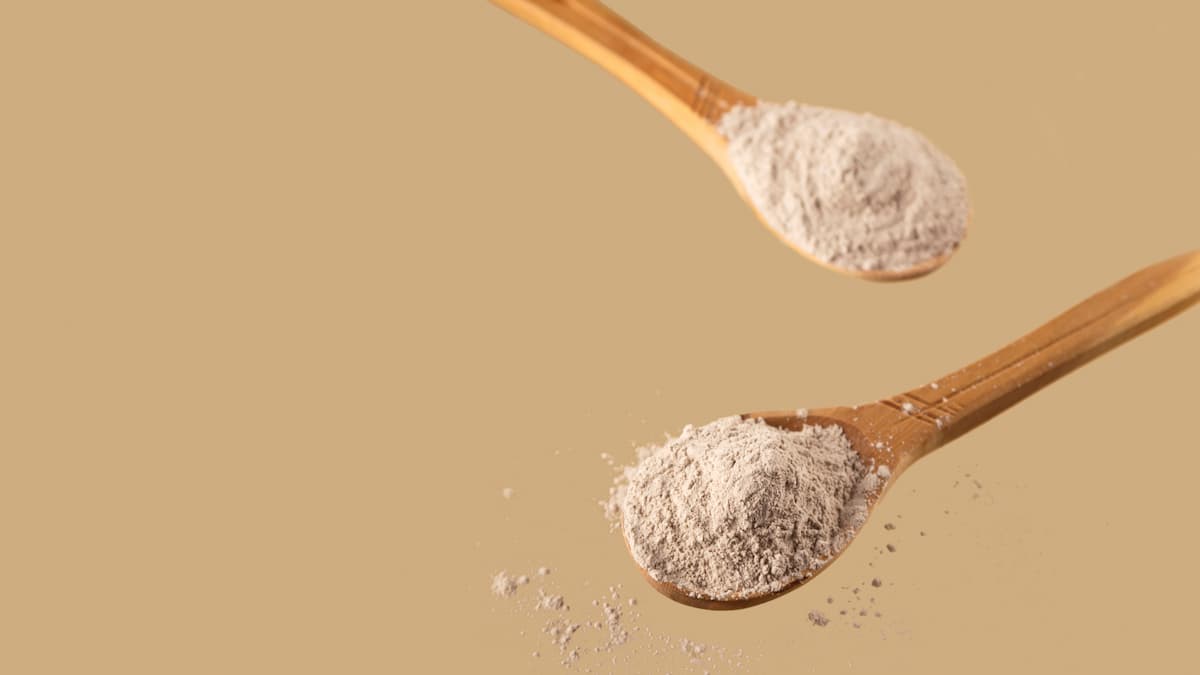
Everything you want to know about COLLinstant collagen.

Collibre collagen is an interesting supplement in shot form.
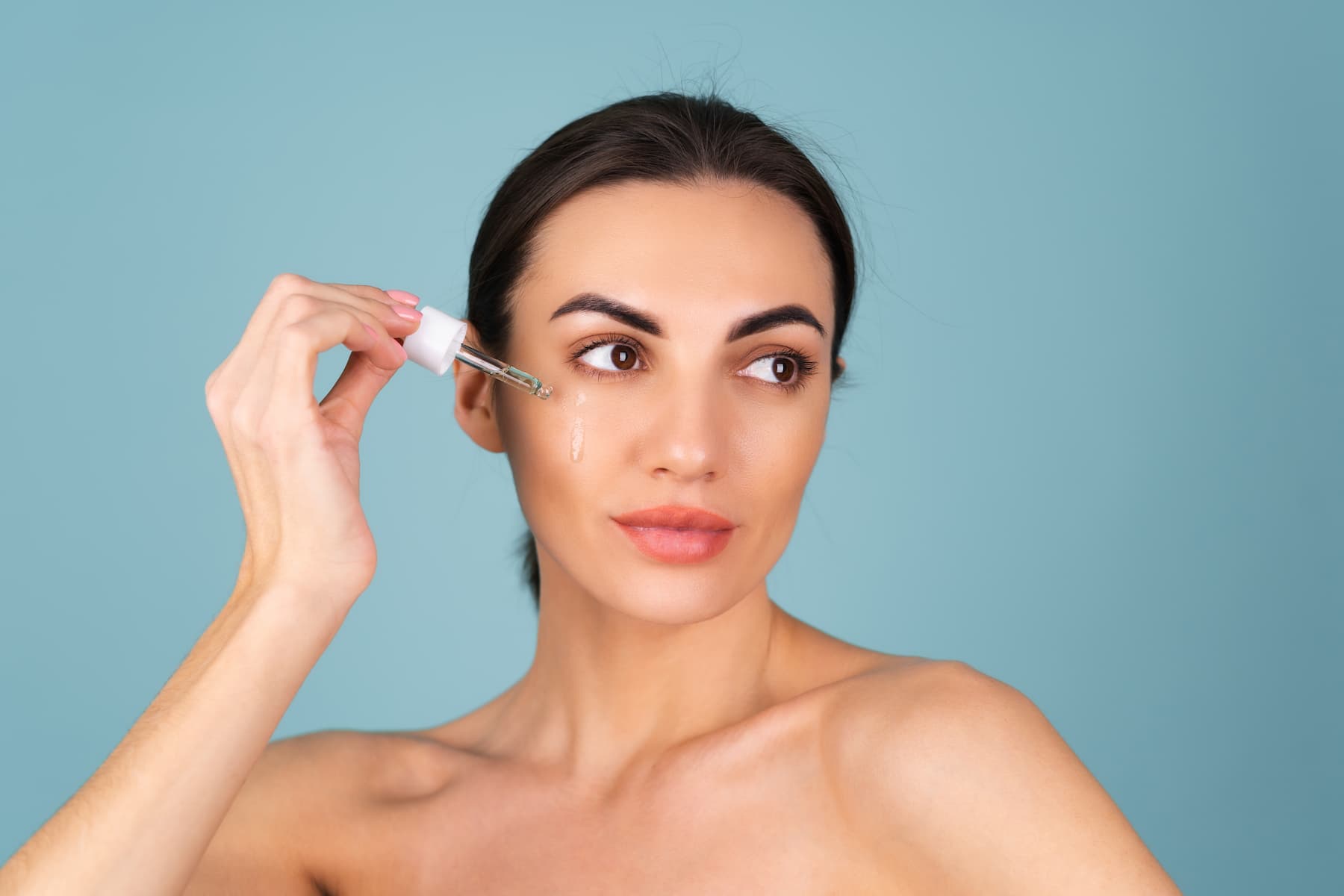
Solgar collagen with hyaluronic acid is a dietary supplement that supports skin and joint health.
